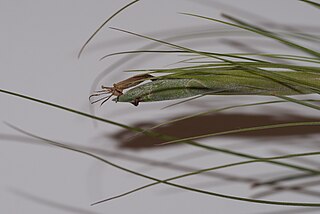
Tillandsia is a genus of around 650 species of evergreen, perennial flowering plants in the family Bromeliaceae, native to the forests, mountains and deserts of northern Mexico and south-eastern United States, Mesoamerica and the Caribbean to mid Argentina. Their leaves, more or less silvery in color, are covered with specialized cells (trichomes) capable of rapidly absorbing water that gathers on them.

Tillandsia balbisiana, common name northern needleleaf, is a species of bromeliad in the genus Tillandsia. This species in native to Mexico, Central America, Colombia, Venezuela, the West Indies, and Florida.

Tillandsia bulbosa, the bulbous airplant, is a species in the genus Tillandsia. It is widespread across Central America, the West Indies, southern Mexico, and northern and eastern South America.

Tillandsia brachycaulos is a species in the genus Tillandsia. It is native to Mexico, Central America, and Venezuela.

Tillandsia gardneri is a species in the genus Tillandsia. This species is native to Trinidad & Tobago, Colombia, eastern Brazil and Venezuela.

Tillandsia juncea is a species in the genus Tillandsia. This species is native to northern South America, Central America, Mexico and the West indies.

Tillandsia stricta is a species in the genus Tillandsia. This species is native to South America and Trinidad.

Tillandsia tenuifolia, the narrowleaf airplant, is a species in the genus Tillandsia. This species is widespread across much of South America and the Caribbean islands.

Tillandsia fasciculata, commonly known as the giant airplant or cardinal airplant, is a species of bromeliad that is native to Central America, Mexico, the West Indies, northern South America, and the southeastern United States. Within the United States, this airplant is at risk of extirpation from the Mexican bromeliad weevil, Metamasius callizona.
Tillandsia flexuosa, the twisted airplant, is a species of bromeliad in the genus Tillandsia. This species is native to Central America, southeastern Mexico, northern South America and the United States (Florida).

Tillandsia schiedeana is a species in the genus Tillandsia. It was named for the collector Schiede. As an epiphyte it is found "growing in open tropical forests, and saxicolous, growing on cacti and burseras on steep dry slopes in semiarid regions in Mexico, Central America, West Indies, Venezuela, and Colombia at elevations of 750 to 5,500 feet."

Tillandsia utriculata, commonly known as the spreading airplant or the giant airplant, is a species of bromeliad that is native to Florida and Georgia in the United States, the Caribbean, southern and eastern Mexico, Central America, and Venezuela.
Tillandsia amicorum is a species in the genus Tillandsia. This species is native to Venezuela.
Tillandsia clavigera is a species in the genus Tillandsia. This species is native to Venezuela, Colombia, Peru, and Ecuador.
Tillandsia elongata is a species in the genus Tillandsia. It is native to Central America, Yucatán, Jamaica, Trinidad, and northern South America.

Tillandsia fendleri is a species in the genus Tillandsia. This species is native to the West Indies and South America.

Tillandsia funckiana is a species in the genus Tillandsia. This species is native to Venezuela.
Tillandsia pyramidata is a species of flowering plant in the Bromeliaceae family. It is native to Bolivia, Venezuela, Colombia, and Ecuador. Two varieties are recognized:
- Tillandsia pyramidata var. pyramidata - Venezuela, Colombia, Ecuador, Peru
- Tillandsia pyramidata var. viviparaRauh - Ecuador and Junín Province of Peru
Tillandsia schultzei is a species in the genus Tillandsia. This species is native to Venezuela. The name of the species is given by Hermann August Theodor Harms. Tillandsia schultzei is an evergreen and the height of a perennial reach of 50 to 70 centimeters.
Tillandsia turneri is a species of flowering plant in the Bromeliaceae family. This species is native to Venezuela, Colombia, Guyana, and northern Brazil.












